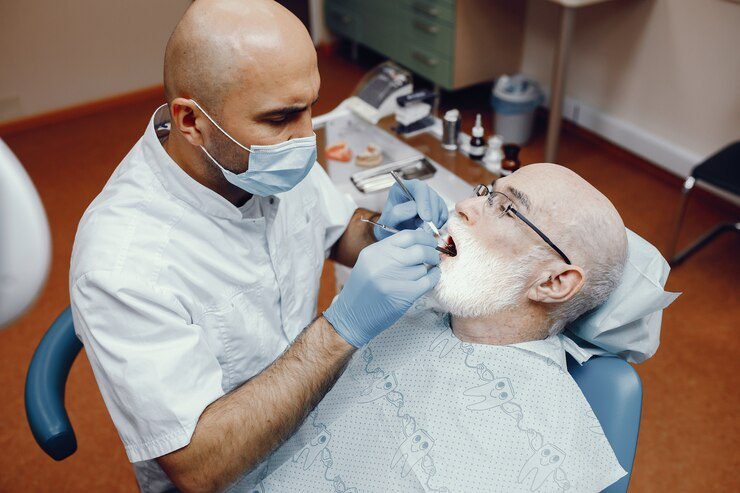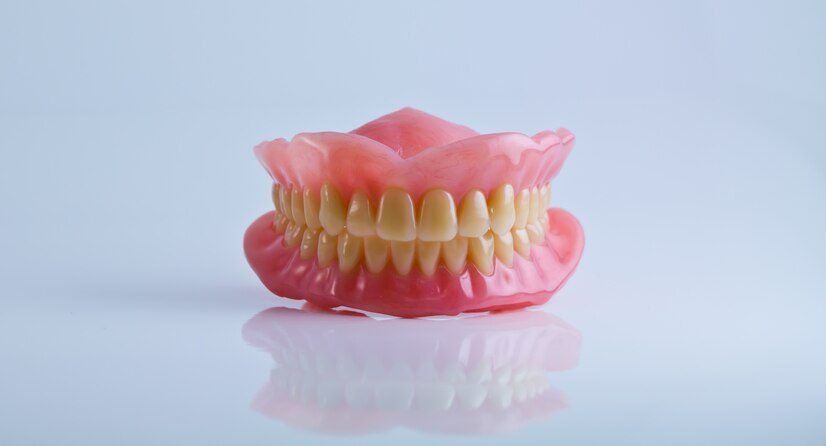Physical Address
304 North Cardinal St.
Dorchester Center, MA 02124
Physical Address
304 North Cardinal St.
Dorchester Center, MA 02124

Explore dental restoration options to restore both function and beauty to your smile.

Dentures are an effective solution for individuals who have multiple missing teeth and are seeking to restore their ability to chew and speak with ease. These removable dental appliances are custom-made to fit the unique contours of each patient’s mouth, providing a comfortable and natural-looking solution.
One of the primary benefits of dentures is that they not only restore function but also enhance esthetics and confidence. With advancements in technology, dentures are now designed to closely resemble natural teeth, allowing individuals to regain a beautiful smile that they can be proud of. This restoration of aesthetics can have a profound impact on an individual’s self-esteem and overall well-being. Dentures not only restore the appearance of a full set of teeth, but they also restore the ability to chew effectively and speak clearly. This can greatly improve an individual’s quality of life, making it easier to enjoy a wide range of foods and participate in social activities without feeling self-conscious.

Dental restoration offers a range of benefits, both functional and aesthetic, for individuals with missing teeth or dental issues. One of the key advantages is improved oral health. Restorative procedures can help prevent further dental issues by addressing problems such as tooth decay and damage. By restoring these affected teeth, individuals can effectively maintain their oral hygiene and reduce the risk of gum disease or infections.
Another significant benefit is the enhanced aesthetics and confidence that dental restoration can provide. Missing teeth can have a negative impact on one’s self-esteem and overall appearance. With dental restoration, individuals can regain a natural-looking smile, which can boost confidence in social and professional interactions. By seamlessly blending in with the remaining teeth, restorations can achieve an aesthetically pleasing result, allowing individuals to feel more comfortable and confident in their smiles.

Maintaining good oral health is crucial for overall well-being, and dental restoration plays a key role in achieving this goal. When it comes to improving oral health, dental restoration procedures offer several benefits. Firstly, they help in repairing and replacing damaged or missing teeth, which can prevent further oral health issues from arising. Additionally, dental restorations aid in restoring proper alignment and bite, which can alleviate discomfort and reduce the risk of dental problems in the future. By addressing these issues promptly, individuals can significantly improve their oral health and enhance their quality of life.
Furthermore, dental restoration procedures contribute to the prevention of gum disease. Missing teeth can cause the remaining teeth to shift, leading to gaps and spaces that can trap bacteria and food particles. This can eventually result in gum infections and periodontal problems. Dental restorations such as dental implants, bridges, and dentures can effectively fill these gaps and prevent the accumulation of harmful bacteria. By restoring the natural structure of the teeth, these procedures promote a healthier oral environment and reduce the risk of gum disease. Ultimately, improved oral health through dental restoration allows individuals to enjoy a confident smile and maintain optimal overall health.
Enhanced aesthetics and confidence are two key benefits of dental restoration. When teeth are missing, damaged, or discolored, it can have a significant impact on a person’s self-esteem. Dental restoration procedures, such as dental implants, bridges, and veneers, can help to improve the appearance of the teeth and restore confidence in one’s smile.
Having a smile that you feel proud of can greatly enhance your overall self-confidence. With dental restoration, you can achieve a smile that looks natural and aesthetically pleasing. Whether it’s replacing a missing tooth with a dental implant or using veneers to correct the appearance of stained or misshapen teeth, these procedures can dramatically improve the overall look of your smile.
Furthermore, a beautiful smile can positively impact your personal and professional life. It can make you feel more confident and comfortable in social situations, allowing you to interact with others without feeling self-conscious about your teeth. Additionally, studies have shown that people with attractive smiles are often perceived as more friendly, successful, and trustworthy, which can have a significant impact on various aspects of life, including job interviews and personal relationships.
Overall, dental restoration not only enhances the aesthetics of your smile but also boosts your confidence and improves your quality of life.
When multiple teeth are missing, it can greatly impact a person’s ability to chew and speak effectively. However, with the help of dental restoration, this function can be restored, allowing individuals to enjoy a normal and healthy life. Restorative options such as dental implants, bridges, and dentures are designed to mimic the look and feel of natural teeth, providing a secure and sturdy foundation.
One of the key benefits of restoring the ability to chew and speak is the improvement it brings to a person’s overall quality of life. With missing teeth, simple tasks like biting into an apple or speaking clearly can become a challenge. Dental restoration not only enhances the functionality of the teeth but also restores confidence in one’s ability to eat, speak, and smile without any hesitation. Whether it’s enjoying favorite foods again or engaging in conversations with ease, regaining the ability to chew and speak is an invaluable aspect of dental restoration.
The table below outlines the transformative impact of dental restoration in restoring the ability to chew and speak, enhancing oral function and quality of life for individuals undergoing dental rehabilitation.
| Aspect | Restored Ability to Chew and Speak with Dental Restoration |
|---|---|
| Functional Improvement | Dental restoration procedures, such as dental implants, bridges, and dentures, restore missing or damaged teeth, improving chewing efficiency and restoring the ability to bite and chew a variety of foods. |
| Speech Enhancement | Dental restorations, particularly those addressing missing or misaligned teeth, can improve speech clarity by providing support to the lips and tongue, facilitating proper pronunciation and articulation. |
| Aesthetic Enhancement | Dental restorations improve the appearance of the smile, enhancing confidence and self-esteem, which positively impacts social interactions, communication, and overall quality of life. |
| Bite Alignment | Dental restorations correct bite misalignment issues, improving occlusal stability and reducing strain on the jaw muscles, leading to more comfortable chewing and speaking experiences. |
| Oral Comfort | Dental restorations eliminate discomfort associated with missing or damaged teeth, allowing individuals to enjoy pain-free chewing and speaking and enhancing overall oral comfort and well-being. |
| Long-term Function | Dental restorations are designed to provide long-lasting function and durability, enabling individuals to enjoy restored chewing and speaking abilities for years to come with proper care and maintenance. |
| Customization | Dental restorations are customized to each individual’s unique dental anatomy and aesthetic preferences, ensuring optimal fit, comfort, and functionality tailored to their specific needs. |
| Comprehensive Care | Dental restoration may involve a multidisciplinary approach, combining various dental specialties such as prosthodontics, periodontics, and oral surgery to address complex dental rehabilitation needs comprehensively. |
| Patient Education | Patient education plays a crucial role in ensuring successful dental restoration outcomes, empowering individuals with knowledge on oral hygiene practices, maintenance, and the importance of regular dental check-ups. |
| Rehabilitation Goals | Dental restoration aims to restore oral function, aesthetics, and comfort, enabling individuals to regain confidence in their ability to chew, speak, and smile, thereby improving overall quality of life. |
Prevention is always better than cure, and this holds true when it comes to dental issues. Dental restoration plays a vital role in preventing further dental problems. By addressing tooth decay, damage, or missing teeth, you can avoid additional complications down the road.
One key benefit of dental restoration is the prevention of further tooth decay. When cavities are left untreated, they can spread and cause infection, leading to more serious dental issues. Dental fillings or crowns can restore the damaged tooth, preventing the progression of decay and preserving the natural tooth structure.
In addition, dental restoration can help prevent gum disease. When teeth are missing or damaged, it can create gaps or spaces where bacteria can accumulate. This can lead to gum inflammation and infection. Restorative procedures such as dental implants or bridges can fill in the gaps, maintaining proper alignment and reducing the risk of gum disease.
By addressing dental issues promptly through restoration, you not only prevent further damage to your teeth but also protect your overall oral health. Consulting with a dental professional will help determine the most suitable restoration option for your specific needs, ensuring a healthy and beautiful smile for years to come.
Regular dental check-ups are essential for determining the need for dental restoration. During these appointments, your dentist will thoroughly examine your teeth and gums, looking for signs of tooth decay, damage, or any other oral health issues that may require restoration. X-rays and other diagnostic tools may also be used to get a more detailed view of your oral health.
One of the key indicators of the need for dental restoration is tooth decay. If you experience persistent toothaches, tooth sensitivity, or notice dark spots or pits on your teeth, it could be a sign of decay. Additionally, if you have chipped, cracked, or broken teeth, restoration may be necessary to repair and protect the affected teeth. Your dentist will carefully assess the extent of the damage to determine the most appropriate restoration option for you.
Determining the need for dental restoration also involves assessing tooth loss. Whether it is due to tooth decay, trauma, or gum disease, missing teeth can have a substantial impact on your oral health and overall quality of life. Your dentist will evaluate the surrounding teeth, the strength and density of your jawbone, and consider various factors such as your age and overall health to determine the best restoration option for replacing the missing teeth and restoring your smile.
Remember, only a qualified dental professional can accurately determine the need for dental restoration. Regular dental visits are crucial in identifying and addressing any issues promptly, ensuring the optimal health and function of your teeth and gums.
Tooth decay and damage can have a significant impact on your oral health. It is important to be aware of the signs that indicate potential problems so you can seek timely treatment. One common sign of tooth decay is the presence of cavities. These are small holes that develop on the surface of the teeth and are often accompanied by tooth sensitivity, pain, or discomfort. Another indication of tooth decay is the appearance of dark spots or discoloration on the tooth surface. Additionally, if you notice a persistent bad taste or odor in your mouth, it may be a sign of decay or infection.
Damage to the teeth can occur as a result of trauma or certain habits, such as teeth grinding or biting on hard objects. Cracked or chipped teeth are common signs of dental damage and can cause pain or sensitivity when chewing or drinking hot or cold beverages. Another indication of tooth damage is tooth sensitivity, which can occur when the protective enamel layer is worn down, exposing the sensitive inner layers of the tooth. If you experience any of these signs, it is important to consult with a dental professional for an evaluation and appropriate treatment. Early intervention can help prevent further decay or damage and preserve your oral health.
Assessing tooth loss is a critical step in determining the appropriate dental restoration option for patients. When teeth are missing, it can have a significant impact on oral health and overall quality of life. Dentists carefully evaluate the extent of tooth loss and the underlying cause to develop a tailored treatment plan.
During the assessment, the dentist will closely examine the patient’s mouth, looking for any visible gaps where teeth should be present. X-rays may also be taken to get a more comprehensive view of the teeth, roots, and surrounding bone structure. This detailed evaluation allows the dentist to accurately assess the number of missing teeth, the condition of the remaining teeth, and the overall health of the mouth.
Assessing tooth loss is not only about counting the number of missing teeth, but also about understanding the underlying factors that led to the tooth loss. This could be due to tooth decay, gum disease, trauma, or other oral health issues. By identifying the cause, the dentist can recommend the most appropriate restoration option, whether it’s dental implants, dentures, or a dental bridge, to restore both function and aesthetics.
Understanding the impact of tooth loss on oral health is crucial in highlighting the importance of dental restoration. When a tooth is missing, it creates an empty space in the mouth which can lead to various oral health issues. One of the immediate impacts of tooth loss is the shifting of adjacent teeth. The surrounding teeth tend to lean or drift towards the gap, causing misalignment and bite problems. This misalignment not only affects the appearance of the smile but also puts additional stress on the remaining teeth, leading to increased wear and tear over time.
Moreover, tooth loss can also result in bone loss in the jaw. When a tooth is extracted or falls out, the root is no longer stimulating the underlying bone. As a result, the bone begins to deteriorate, which can weaken the overall structure of the jaw. This can lead to further tooth loss, as the weakened bone is less able to support dental implants or other restorative treatments. Additionally, the loss of bone density can also alter facial structure, causing a sunken appearance.
Understanding these consequences of tooth loss highlights the urgency of seeking dental restoration. By replacing missing teeth, either through dentures, implants, or other restoration options, individuals can prevent further oral health issues and preserve the integrity of their smile. Dental restoration not only improves the function of the teeth, allowing for proper chewing and speaking, but it also enhances overall oral health, prevents bone loss, and restores confidence in one’s smile.
When it comes to choosing the right dental restoration option, there are several factors to consider. One important aspect is the extent of the damage or tooth loss. The specific restoration option will vary depending on whether you have minor decay, significant tooth damage, or multiple missing teeth. It’s crucial to consult with a dental professional who can thoroughly assess your oral health and provide personalized recommendations.
Another factor to consider is your long-term dental goals. Are you primarily concerned with restoring function and the ability to chew and speak comfortably? Or are you equally focused on enhancing the aesthetics of your smile? Understanding your priorities will help guide you towards the most suitable restoration option.
It’s also important to consider the maintenance and long-term care required for each restoration option. Some options may require more frequent visits to the dentist for adjustments or repairs, while others may necessitate more rigorous cleaning routines at home.
Ultimately, the right dental restoration option will be a combination of your specific needs, desired outcomes, and the professional recommendations of your dentist. By carefully considering these factors and engaging in open communication with your dental provider, you can make an informed decision that restores both the function and beauty of your smile.
Factors to Consider
When it comes to choosing the right dental restoration option, there are several factors that should be taken into consideration. One important factor is the extent of the damage or decay to the tooth or teeth in question. For minor issues, such as small cavities or minor chips, a simple dental filling may be sufficient. However, for more severe damage or extensive tooth loss, a more substantial restoration option, such as a dental crown or bridge, may be necessary.
Another factor to consider is the overall oral health of the patient. In some cases, underlying oral health issues, such as gum disease or bone loss, may need to be addressed before a dental restoration can take place. It is important for a dental professional to thoroughly assess the patient’s oral health and address any underlying issues before proceeding with a restoration. Additionally, the patient’s oral hygiene habits and commitment to dental care will also play a role in determining the most appropriate restoration option. Regular brushing, flossing, and routine dental visits are essential for maintaining the longevity of any dental restoration.
Consulting with a dental professional is an important step in determining the best dental restoration option for your specific needs. A dentist has the expertise and knowledge to assess your oral health condition and recommend the most appropriate treatment plan. During a consultation, your dentist will thoroughly examine your teeth, gums, and overall oral health to identify any dental issues that need to be addressed.
In addition to a physical examination, your dentist may also use diagnostic tools, such as X-rays or dental impressions, to get a better understanding of your dental condition. This information will help them determine the extent of the damage or decay and guide them in recommending the most suitable restoration option. By discussing your concerns and goals with your dentist, you can actively participate in the decision-making process and ensure that you receive personalized care tailored to your unique needs.
During the consultation, your dentist will also take the time to educate you about the different restoration options available and explain the benefits and potential risks associated with each. They will answer any questions or concerns you may have, providing you with the necessary information to make an informed decision. With their professional guidance, you can choose a restoration option that aligns with your preferences, budget, and long-term oral health goals. So, don’t hesitate to schedule a consultation with a dental professional to begin your journey towards a restored and confident smile.
When it comes to restoring your smile, a customized treatment plan is of utmost importance. Every individual has unique dental needs and preferences, and a customized plan ensures that those needs are met effectively and efficiently.
A dental professional will carefully evaluate your oral health and discuss your goals and expectations in order to create a treatment plan that is tailored specifically to you. This plan may include various restorative options such as dental implants, bridges, or dentures, depending on the extent of tooth loss and your overall oral health. By customizing your treatment plan, the dental professional can address your specific concerns and ensure that the restoration is not only functional but also aesthetically pleasing.
Customized treatment plans not only take into account your dental needs but also consider your overall health, budget, and personal preferences. This holistic approach ensures that you receive the best possible dental restoration that suits your individual circumstances. So, whether you are missing a single tooth or multiple teeth, a customized treatment plan can help you regain your smile and improve your quality of life.
Maintenance and long-term care are essential aspects of dental restoration to ensure the longevity of your restored smile. After undergoing dental restoration, it is crucial to maintain good oral hygiene practices to prevent further dental issues and maintain the health of your teeth and gums.
Regular brushing and flossing should be a part of your daily oral care routine. Use a soft-bristled toothbrush and fluoride toothpaste to gently clean your teeth, paying close attention to the areas around your dental restorations. Flossing helps remove plaque and debris from between your teeth and under the gumline, promoting healthy gums and preventing gum disease.
In addition to a proper oral hygiene routine, regular dental check-ups and cleanings are vital for maintaining your dental restorations. Your dentist will closely monitor the condition of your restorations and assess any signs of wear or damage. Professional cleanings can effectively remove plaque and tartar buildup that cannot be removed through regular brushing and flossing. During these visits, your dentist may also recommend additional treatments or modifications to ensure the continued success of your dental restoration.
By prioritizing maintenance and long-term care, you can keep your newly restored smile looking and functioning its best for years to come. Remember, the key to successful dental restoration lies in the continued dedication to oral hygiene practices and regular dental visits.
Dental restoration plays a crucial role in improving both the function and beauty of your smile. By exploring the various topics related to dental restoration, you can gain a comprehensive understanding of how it can benefit you. Whether you have multiple missing teeth, tooth decay, or other dental issues, consulting with a dental professional is essential to determine the best restoration option for your specific needs.
A dental professional will assess your oral health and provide customized treatment plans tailored to your situation. They will consider factors such as the extent of tooth loss or damage, your overall dental health, and your aesthetic goals. With their expertise and knowledge, they can guide you towards the most suitable restoration option, whether it’s dental implants, dentures, bridges, or other alternatives.
Regaining your confidence in your smile is not only about enhancing your appearance but also about restoring your ability to chew and speak properly. Dental restoration can address these functional concerns, allowing you to enjoy meals, conversations, and social interactions without discomfort or embarrassment. Don’t hesitate to consult with a dental professional and embark on the journey to a healthier, more beautiful smile today.
Dentures are removable appliances that replace missing teeth and restore function by allowing individuals to chew and speak properly. They are custom-made to fit the patient’s mouth and can replace multiple missing teeth.
Dental restoration improves oral health by addressing issues such as tooth decay, damage, and tooth loss. By restoring damaged or missing teeth, it helps maintain proper dental alignment, prevents further dental issues, and promotes overall oral health.
Yes, dental restoration can enhance aesthetics and confidence. By filling gaps caused by missing teeth, restoring damaged teeth, and improving the overall appearance of the smile, individuals can regain their confidence and have a more attractive smile.
Absolutely! Dental restoration, such as dentures or dental implants, can help restore the ability to chew and speak properly. By replacing missing teeth or repairing damaged ones, individuals can enjoy improved functionality in their mouth.
Yes, dental restoration can prevent further dental issues. By addressing tooth decay, damage, or missing teeth, it helps maintain oral hygiene, prevents the shifting of teeth, and reduces the risk of future dental problems.
There are several signs that indicate the need for dental restoration. These include tooth decay, visible damage to teeth, tooth sensitivity, difficulty chewing or speaking, and tooth loss. If you experience any of these issues, it is advisable to consult with a dental professional.
Tooth loss can be assessed by examining the gaps in your teeth or feeling the absence of teeth in your mouth. The impact on oral health includes difficulty chewing, potential shifting of remaining teeth, changes in facial structure, and an increased risk of gum disease.
When choosing a dental restoration option, you should consider factors such as your oral health condition, the number of missing or damaged teeth, your budget, and your desired aesthetic outcomes. Consulting with a dental professional can help you make an informed decision.
A consultation with a dental professional is essential as they can evaluate your oral health, discuss your concerns and goals, and recommend the most suitable restoration option for your specific needs. They have the expertise to guide you towards the best solution.
Maintenance and long-term care for dental restorations vary depending on the type of restoration. Regular dental check-ups, proper oral hygiene practices, and avoiding damaging habits like teeth grinding can help prolong the lifespan of your restorations. Your dentist will provide specific instructions for care.